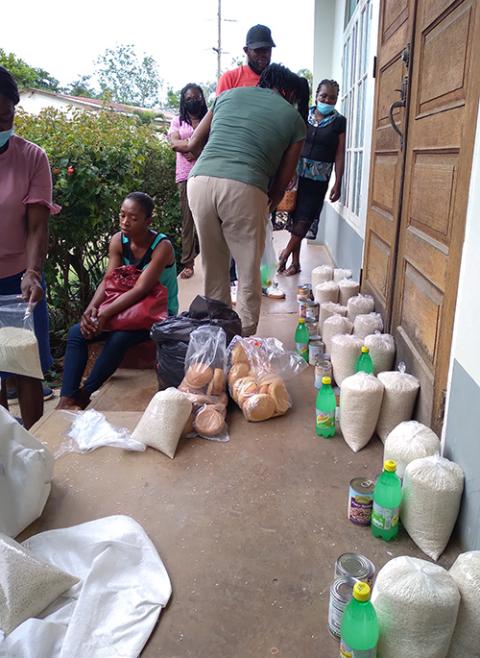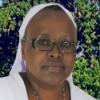
Sr. Elizabeth Njorge distributes nutrition packets and donations of clothes to families in Jamaica after the nutrition workshop in August 2023. (Courtesy of Elizabeth Njorge)
I am an Assumption Sister of Nairobi, Kenya, working in Jamaica. I never dreamed I would be a missionary, but it is a wonderful vocation. I am the youngest of eight children, six boys and two girls. In 2008, I decided to join the Assumption Sisters, a local congregation, and took final vows 10 years later.
I love our charism that calls us to immerse ourselves among the people as "life-givers" by spreading the good news. Our mission is to uplift the dignity of all, especially women. In response to the changing world, the congregation expanded our mission outside Africa to Jamaica.
Receiving an invitation to work in Jamaica was exciting. I had been working in Kenyan dioceses as a social worker for several years when the sister in charge of the HIV/AIDS project in Jamaica was seeking volunteers to work with her. Because there were few volunteers among our sisters, the superior approached me asking me to consider it. I was thrilled because I find great joy in working in difficult areas, and Lodwar and Isiolo, regions of my former missions in Kenya, were particularly challenging.
There was limited access to clinics in the Lodwar region, so we began outreach efforts to provide medical care to patients far from any health care facilities. Our outreach team would endure a five-hour journey on poor roads to reach them. However, outreach work posed safety concerns if caught in conflicts and raiding activities between the Amarille and Turkana people, often necessitating a three-day stay at the police camp for security. Despite these challenges, our outreach efforts were consistently positive.
Similarly, I found challenges within the Isiolo Diocese, where we focused on children’s health, where families also had difficulties of access. Our team became advocates against female genital mutilation, and forced marriages because of its impact on girls' health. However, we met resistance from the Borana tribe leaders, whose cultural practices made them reluctant to work with us.
Leaving these challenges behind, I traveled to Jamaica in October 2019 and joined the community to coordinate a home-based HIV/AIDS program, working with youth and families.
Advertisement
I found Jamaica to be a beautiful island, the third largest island in the Caribbean Sea after Cuba and Hispaniola, and west of Haiti. The majority of the population is of African descent, the result of slavery by the Spanish in the 17th century, and later the British. The British eventually drove the Spanish out. Later they freed colony slaves in 1838. Jamaica became independent in 1962. The economy is based on industries like tourism and agriculture, primarily sugar cane and fruits. English and Creole are the major languages.
Tourism, although a blessing, is a risk to youth who are unemployed and frequently lured into sex work, dramatically increasing HIV/AIDS. The government has made great efforts to address the situation, but it remains challenging.
In 2021, when I was introduced to the online program "Learning for Humanity," sponsored by Medicines for Humanity, I enrolled in a health care management course and a nutrition course. Both have helped me become a much better social worker and manager, and led me into extensive community outreach.
The inspiration for furthering my understanding of nutrition came from people having difficulty managing their medications for HIV/AIDS. In listening to them, I realized that their immune systems were weakened because they were taking the medication on empty stomachs. I discovered that they were unable to afford three meals each day, or that what they did eat was not nutritionally balanced.
I also discovered through outreach activities that it was not only those with HIV who were suffering nutritionally but also older adults whose families had emigrated, leaving them to fend for themselves. I was compelled to do something about the nutrition issue, but my greatest obstacle was the lack of funding.
I felt overwhelmed and uncertain about how to begin. Drawing on the knowledge I gained in the nutrition course, I decided to seek resources locally. I searched for individuals willing to support this vision, even visiting open-air markets.

The nutrition packets, donated by businesses in town, provide a nutritionally balanced diet for two weeks, including rice, peas, snacks and cornmeal. (Courtesy of Elizabeth Njorge)
In one, I met a kind Seventh-day Adventist woman selling fruits. My story touched her, and she spoke about the positive impact of the Catholic Church in Jamaica. During our conversation, she generously donated ripe bananas for the families in need and pledged to continue supporting us with fruits.
I also sent letters to various supermarkets and restaurants, including Kentucky Fried Chicken. Within three weeks, I began receiving donations of food, clothing and other essential supplies. Some stakeholders pledged monthly contributions.
With my spirits lifted, I organized a community meeting on nutrition. I invited a nutritionist from a local nongovernmental organization who agreed to speak free of cost. The meeting was well attended, and the community was thrilled to be invited. At the end of it, I distributed food packages to provide a nutritionally balanced diet to sustain them for two weeks.
One of the attendees, a gentleman of age 80, expressed his appreciation for the workshop and the support. He told us that his family in the United States cannot fully support him and then humorously remarked that being underweight, he might now gain some back. He encouraged the other participants to respect the Catholic Church, which welcomes everyone without discrimination and extended gratitude to all the supporters. It was truly heartwarming to witness such happiness and receive positive feedback.
I then personally visited older adults who were unable to attend the meeting and coordinated with their neighbors to do regular nutrition check-ins. When I found older adults who were ill, I arranged for their transfer to a specialized facility for elder care.
Demonstrating unwavering commitment to this project and regularly updating the stakeholders assured me of their continued support. I have learned much about the value of collaboration with stakeholders, volunteers from other organizations and the community in general.
I cannot say enough about the value of the training I received through the Learning for Humanity platform. I was empowered with knowledge that had a great positive effect on community health. I gained new confidence in myself — faith in my capabilities and a much greater awareness of personal potential. Working with the community here in Jamaica continues to bring me much joy.







